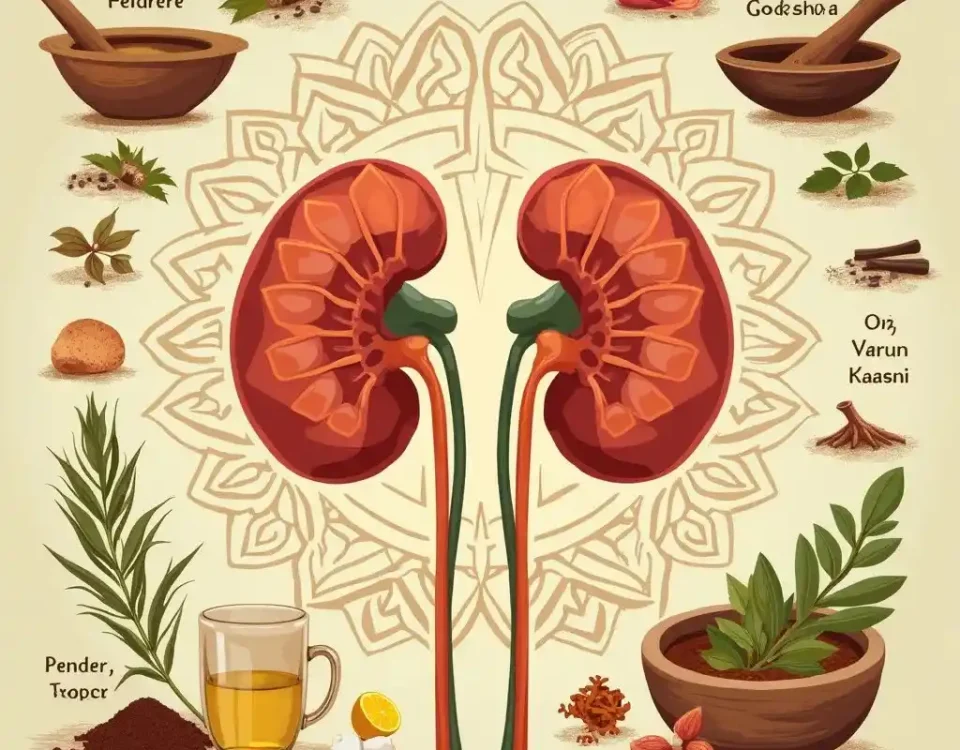- Connect Whatsapp
- +917012232608
- [email protected]

Ayurvedic Medicine for Piles: Natural Relief for Hemorrhoids
September 14, 2024
Ayurvedic Treatment for Kidney Creatinine: Nature’s Approach to Renal Health
September 14, 2024Ayurvedic Treatment for Eczema: Nature’s Soothing Touch for Your Skin

Namaste, dear readers! Are you or your loved ones struggling with the itchy, inflamed patches of eczema? In today’s world of stress and environmental pollutants, skin conditions like eczema have become increasingly common. But worry not! Our ancient wisdom of Ayurveda offers a holistic and natural approach to managing this troublesome condition. Let’s embark on a journey to explore how Ayurvedic treatment for eczema can bring relief and restore the natural glow of your skin.
Understanding Eczema through Ayurvedic Lens:
In Ayurveda, eczema is known as ‘Vicharchika’ and is believed to be caused by an imbalance in the Kapha and Pitta doshas. Our ancient texts describe it as a condition characterized by itching, redness, and burning sensation of the skin. Ayurveda views eczema not just as a skin problem but as a manifestation of internal imbalances, particularly in the digestive system and blood.
The Ayurvedic Approach to Eczema:
Ayurveda offers a comprehensive approach to managing eczema, focusing on:
- Balancing the doshas
- Improving digestion and metabolism
- Detoxifying the body
- Strengthening the immune system
- Nourishing and healing the skin
Let’s delve into some key aspects of Ayurvedic treatment for eczema:
- Dietary Recommendations:
Ayurveda places great emphasis on diet in managing eczema. Here are some dietary tips:
- Avoid trigger foods: Common triggers include dairy, wheat, soy, and nightshade vegetables.
- Include cooling foods: Cucumber, coconut, and bitter gourd can help balance Pitta dosha.
- Opt for easily digestible foods: Light, warm, and freshly cooked meals are recommended.
- Stay hydrated: Drink ample water and herbal teas to flush out toxins.
- Include anti-inflammatory foods: Turmeric, ginger, and amla (Indian gooseberry) can help reduce inflammation.
- Herbal Remedies:
Ayurveda offers a treasure trove of herbs that can help manage eczema:
- Neem: Known for its anti-inflammatory and antibacterial properties, neem can help soothe itchy and inflamed skin.
- Manjistha: This herb is excellent for purifying blood and reducing inflammation.
- Guduchi: It helps boost immunity and has anti-allergic properties.
- Karanja: Its oil is known for its effectiveness in treating skin conditions.
- Triphala: This combination of three fruits helps in detoxification and improving digestion.
- Lifestyle Modifications:
Ayurveda recommends several lifestyle changes to manage eczema:
- Stress management: Practice meditation or pranayama to reduce stress, which can trigger eczema flare-ups.
- Regular exercise: Gentle exercises like yoga can improve circulation and reduce stress.
- Proper sleep: Adequate sleep is crucial for skin healing and overall health.
- Avoid harsh chemicals: Use natural, gentle products on your skin and in your home.
- Panchakarma Therapies:
In more severe cases, Ayurvedic practitioners might recommend Panchakarma therapies like:
- Virechana (purgation therapy): It helps eliminate excess Pitta from the body.
- Vamana (therapeutic emesis): This can help remove excess Kapha.
- Rakta Mokshana (bloodletting): In specific cases, this therapy might be recommended to purify the blood.
- Topical Applications:
Ayurveda also offers topical treatments for eczema:
- Coconut oil: Its moisturizing and antimicrobial properties can soothe eczema-prone skin.
- Neem and Turmeric paste: A paste made from these herbs can be applied to reduce inflammation and itching.
- Aloe Vera gel: It can provide cooling relief and promote skin healing.
The Holistic Benefit of Ayurvedic Approach:
What makes Ayurvedic treatment for eczema truly special is its holistic nature. By addressing the root cause of the problem and focusing on overall health, Ayurveda not only helps manage eczema but also improves digestive health, reduces stress, and promotes overall well-being.
A Word of Caution:
While Ayurvedic remedies are generally safe, it’s crucial to consult a qualified Ayurvedic practitioner before starting any treatment, especially if you have existing health conditions or are on medication. Ayurvedic treatments should complement, not replace, conventional medical care for eczema.
Conclusion:
Ayurvedic treatment for eczema offers a gentle, natural approach to managing this uncomfortable skin condition. By embracing Ayurvedic principles of balanced diet, herbal remedies, and lifestyle modifications, you can not only find relief from eczema but also improve your overall health and well-being.
Remember, healing takes time, and consistency is key. Be patient with your body and give it the love and care it deserves. As we say in India, “Swasth tvacha, swasth jeevan” (Healthy skin, healthy life). Here’s to your journey towards better skin health, the Ayurvedic way!
FAQ Section:
How long does it take to see results with Ayurvedic treatment for eczema?
The timeline for improvement can vary depending on the severity of the condition and individual factors. Some people may notice improvements within a few weeks, while others might take a few months. Consistency in following the prescribed Ayurvedic regimen is key to seeing positive results.
Can Ayurvedic treatments for eczema be used alongside conventional medications?
In many cases, Ayurvedic treatments can complement conventional medicine. However, it’s crucial to inform both your Ayurvedic practitioner and regular doctor about all treatments you’re undergoing to avoid any potential interactions.
Are there any side effects of Ayurvedic medicines for eczema?
When taken under proper guidance, Ayurvedic medicines are generally considered safe. However, some individuals might experience mild digestive discomfort initially. Always consult a qualified Ayurvedic practitioner before starting any treatment.
Is it safe to use Ayurvedic treatments for eczema during pregnancy?
Some Ayurvedic herbs and treatments may not be suitable during pregnancy. It’s essential to consult with both an Ayurvedic practitioner and your obstetrician before starting any treatment during pregnancy.
Can dietary changes alone help in managing eczema?
While dietary changes play a significant role in Ayurvedic treatment for eczema, they are most effective when combined with other Ayurvedic practices like herbal remedies and lifestyle modifications. A holistic approach typically yields the best results.

